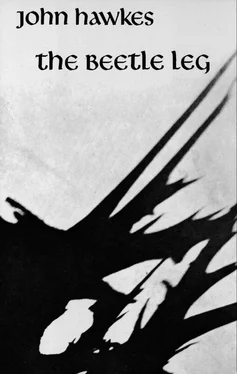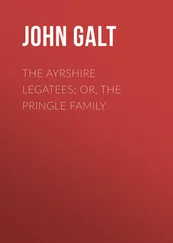John Hawkes - The Beetle Leg
Здесь есть возможность читать онлайн «John Hawkes - The Beetle Leg» весь текст электронной книги совершенно бесплатно (целиком полную версию без сокращений). В некоторых случаях можно слушать аудио, скачать через торрент в формате fb2 и присутствует краткое содержание. Год выпуска: 1951, ISBN: 1951, Издательство: New Directions, Жанр: Современная проза, на английском языке. Описание произведения, (предисловие) а так же отзывы посетителей доступны на портале библиотеки ЛибКат.
- Название:The Beetle Leg
- Автор:
- Издательство:New Directions
- Жанр:
- Год:1951
- ISBN:978-0811200622
- Рейтинг книги:4 / 5. Голосов: 1
-
Избранное:Добавить в избранное
- Отзывы:
-
Ваша оценка:
- 80
- 1
- 2
- 3
- 4
- 5
The Beetle Leg: краткое содержание, описание и аннотация
Предлагаем к чтению аннотацию, описание, краткое содержание или предисловие (зависит от того, что написал сам автор книги «The Beetle Leg»). Если вы не нашли необходимую информацию о книге — напишите в комментариях, мы постараемся отыскать её.
The Beetle Leg
Newsweek
The Beetle Leg
The Beetle Leg — читать онлайн бесплатно полную книгу (весь текст) целиком
Ниже представлен текст книги, разбитый по страницам. Система сохранения места последней прочитанной страницы, позволяет с удобством читать онлайн бесплатно книгу «The Beetle Leg», без необходимости каждый раз заново искать на чём Вы остановились. Поставьте закладку, и сможете в любой момент перейти на страницу, на которой закончили чтение.
Интервал:
Закладка:
“They must have last had this gear on cows.”
A few big ears were pinned back against manes under headbands that had ridden up, and as they stood like burned men dumbly waiting for cindered clothes to fall away, the harness slipped aside from cuts and abrasions. Steam rags had been ironed to their sides and stripped off. Large hoofs, one before the other as if to step, were planted — unpared blocks of chalk — on loose ends of leather that had dragged the miles of the journey. Blister beetles sat on the brass terrets or suddenly still, fell dryly to the ground.
“Ma,” he caught her arm while she continued to hasten, to urge and push them up again, “we can’t reach Clare today.”
“You load this bag. And fetch me Hattie Lampson.”
“Don’t listen,” answered a small, steadily nodding voice, “don’t pay none of this family heed.”
They swept back, made room and left Luke Lampson’s mother her own bright place to stand. She waited, then spoke no louder:
“You’re all welcome.” She nodded, this little woman darkly turned out of the house, this last and oldest divulged by the desert. “I’ll see you off.” She looked at her younger son, but took no step. Ma caught her arm.
“Hattie,” Ma moved her, “can you get up on that seat alone?”
They stood her by the wheel. They stepped back and the old woman shortly swayed, a stalk snapped upwards from the sand by the iron, mud colored rim, a length of wire coiled and motionless in the spokes. The great pinwheel might have ground her cleanly into the dust and she would have crawled away with skin unbruised, with dry pulmonary parts intact. She and the wheel — its tapered bars, sanded rays, were longer than her two arms fully spread — looked as if they would never move again; one, the original means of carrying them from Boonville to the bloody plow handle, the other, that which was originally carried and turned to love in the night’s wagon ring around the fire. But had it turned, and had she fallen, her kerchief caught in the spokes nearest the ground, she would have hung before her feet once more touched the settling, noisy track. And when the wheel did turn, smoke hung thinly about its tin bucket nave where wood burned against wood and miles wound in carbon around the axle.
“You ride in the one behind mine. Mulge comes last.”
The animals awoke. Amid the scraping of slowly prodded hoofs, the slight sway of warty food buckets and rope ends under the wooden bodies, Ma remained at the front of the train holding his mother.
“Put Hattie right up there. That’s it, by me.”
Luke in the second wagon and his brother in the third did not join the singing. The horses, as large as they were, crouched down to pull, their legs spraddled outwards like the flappers of young and panting dogs. Each wagon carried not only its own sounds of travel, the tug, twist and strain of the wooden windlass, but was loaded with the clatter of the other two and moved — one wagon could never make such noise — across the plains like a house athwart rollers.
High on the first prow, wedding bag under the backless seat and the sun softening the wool of her dress, Ma leaned in front of Hattie Lampson and spoke to the driver. The ranch, with no men left behind and guarded only by the Indian child, had disappeared down its faraway indentation in the glazed sand.
“Swing us a little to the other way. I sense it more to the right.”
The woman sawed the reins.
Thus they traveled a dog’s pace on an enormous field that once, perhaps, had been cultivated with shrub, tree and herb, now extinct, which swelled before their eyes at moments with a few head of cattle, with larvae that clustered and disappeared. Not another rider or wagon train crossed their path.
Ma held her hand clasped to her eyes and peered through the thin red line between her fingers. She sat high, a gunman who had crossed the route for forty years on a rocking coach.
“A mighty lot of you turned up.”
“Yep,” said the driver.
“Hattie,” Ma spoke louder, “I’m much obliged. Since you changed your mind.”
The mother of the Lampson boys said nothing, seated in the open heat between a woman almost married to her own son and another still married after rearing five grown men. For Hattie Lampson was taken during the trip to town. Her flat, boneless nose was cold. She nodded.
“Clare by dark,” said Ma to the driver, “maybe sooner.” She shifted. Her long skirts pulled, and she changed her chin to the other hand.
Hattie Lampson began to mumble on top of the hymn singing and turn of the wheels.
“I’m indebted to you ever,” said Ma and put her arm around the dwarfed shoulders. “You been here to give me courage.” Ma rattled, looked at her quickly and gave the cold little woman a rigorous and sudden hug. She snapped free. Ma eased her again under a brown arm and widely ruffled sleeve.
“Hattie. You ain’t going to be doggish. Not on a wedding day.”
They rode unmolested over the flat pan — fifty miles away there might have been a mountain range to seal them perfectly within the white disk passable and clear — and looking way to the ground Ma watched the last of the hoofs, so slowly dropped, switch and explode in dust. She felt under the seat for her finery.
“He’s probably thinking just like me. Now,” said Ma and fanned herself.
Hattie Lampson spoke: “He wasn’t brung up for such. Not to be handed straight over. Naked. He’ll work some now. There ain’t no family. There ain’t even any boys, men neither. You can’t pass them all out. They’re supposed to laze around home. Take care of their own farmyard, they was told.
“They get no pardon. It ain’t just any hound can go out shorn and keep his head up. I say they’re done. My younger has gone just like him. Bringing that Indian into the house is about as bad. Neither one can hold himself straight. They was behind my back.
“Around their age they start feeling worms inside and nothing I say will change it. Why, he’s been walking you sideways for two years steady. And when he won’t touch no food, there’s enough to kill him right there.
“Some just worm themselves in. I ain’t going to be touched now the way you do. You ain’t going to get me to help you mix no water in his meal. Just to lie spread in the dish. I got to watch for him and keep him quiet. But I’m not sure he’ll make much noise anyway. Folks forget. They’ll forget the whole family.
“They won’t even remember what month it was. And he won’t, for sure. No one knows mine neither. You ain’t going to live long enough with my boy to get the yellow off his teeth or bleach out what I learned him. You’re too old.
“It wasn’t much. About when to come inside or out, is all. And if he’s found presumption to do more — and be offensive to some for the time being — I guess you ain’t going to get any good of it. Least to your face.
“I ain’t a person to have stood up for either one of them. I don’t like to see a man worrying about whether his hat is on to front or back. And taken to traveling around on foot, tucking at his shirt and leaning down to loose his shoes. But as of now I cut them off, the two of them.
“Maybe a woman ain’t fit to make something of them in the first place. Maybe I done wrong. And mine is even worse than most. Wherever them worms come from, that’s part the trouble.
“If you can be like me, and I ain’t ready to admit that, your trouble might not be more than mine. But a bad dog just gets worse. I ain’t sure what you’ll do to him; I won’t thank you for it.”
“Hattie,” Ma dropped her arm, “you better draw breath.”
The begrimed driver shook the reins, wiped her face and looked at the old woman. “Mrs. Lampson, you shouldn’t question so. It ain’t right for you to hold out so harsh. This girl’s pure as snow.” She drove again.
Читать дальшеИнтервал:
Закладка:
Похожие книги на «The Beetle Leg»
Представляем Вашему вниманию похожие книги на «The Beetle Leg» списком для выбора. Мы отобрали схожую по названию и смыслу литературу в надежде предоставить читателям больше вариантов отыскать новые, интересные, ещё непрочитанные произведения.
Обсуждение, отзывы о книге «The Beetle Leg» и просто собственные мнения читателей. Оставьте ваши комментарии, напишите, что Вы думаете о произведении, его смысле или главных героях. Укажите что конкретно понравилось, а что нет, и почему Вы так считаете.












